NeptuneAdvisory
Overview
We help our clients develop and refine their investment theses.
Our proprietary research focuses on programmatic & policy analysis to understand the drivers of revenue and gauge where the market is going. We work with our institutional and strategic investment clients to refine their investment theses around highly regulated marketplaces, complementing their fundamental analysis with a blended analysis so they can identify value creation opportunities ahead of market sentiment. We provide our perspective through regularly published proprietary research, unique events, and deep-dive programmatic & policy research. Neptune is not a special situation, political intelligence shop, or a broker/dealer; nor do we make buy, sell, or hold recommendations.
Current and previous work includes retainer-based and project-based engagements for revenue due diligence, targeted research, market assessments, deal sourcing and M&A analysis.
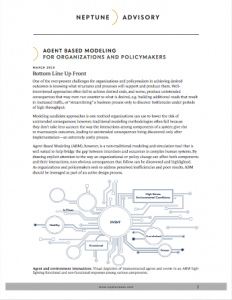
One of the ever-present challenges for organizations and policymakers in achieving desired outcomes is knowing what structures and processes will support and produce them. Well- intentioned approaches often fail to achieve desired ends, and worse, produce unintended consequences that may even run counter to what is desired.
Agent Based Modeling is a modeling and simulation tool that is well suited to help bridge the gap between intentions and outcomes in complex human systems. By drawing explicit attention to the way an organizational or policy change can affect both components and their interactions, non-obvious consequences that follow can be discovered and highlighted. As organizations and policymakers seek to address perceived inefficiencies and poor results, ABM should be leveraged as part of an active design process.
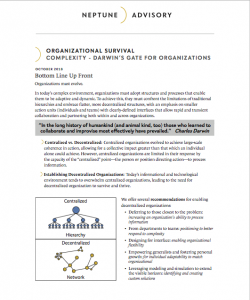
Organizations must evolve.
This often ignored maxim is more critical than ever in today’s complex environment. In this piece, we explore the differences between centralized and decentralized organizations, and offer recommendations for enabling decentralized processes that enhance an organization’s ability to grapple with complexity, ultimately positioning them not only to survive, but thrive.
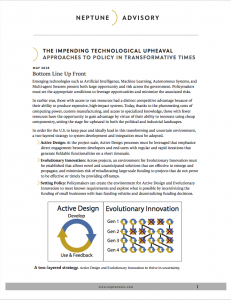
Recent Product
The Impending Technological Upheaval - Approaches to Policy in Transformative Times
Download230.57 KB
As demonstrated by recently introduced legislation and FY19 budget markups, Washington is awakening to the need for policy to address the transformational potential of emerging technologies including Artificial Intelligence, Machine Learning, and Autonomous Systems. However, formulating precise policy is made difficult by the uncertainty that surrounds these technologies and the effects they will bring.
How can we set policy conditions that effectively mitigate risk while simultaneously catalyzing innovation and leveraging opportunities that emerging technologies afford?
This report proposes a two-layered strategy for innovating under uncertainty: Active Design at the project level and Evolutionary Innovation at the acquisition-system level. This strategy is designed to maximize the opportunity for novel innovation while minimizing the cost of inevitable failures.
Finally, recommendations are made for setting policy conditions that can enable this strategy.
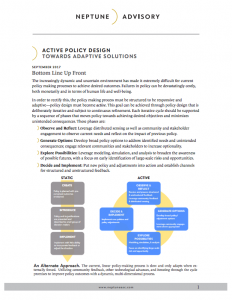
War, failing infrastructure, sickness and disease. How can we make policy that better grapples with today’s problems? The increasingly dynamic and uncertain environment has made it extremely difficult for current policy making processes to achieve desired outcomes. Failures in policy can be devastatingly costly, both monetarily and in terms of human life and wellbeing. In order to rectify this, the policy making process must be structured to be responsive and adaptive—policy design must become active. This goal can be achieved through policy design that is deliberately iterative and subject to continuous refinement. Each iterative cycle should be supported by a sequence of phases that moves policy towards achieving desired objectives and minimizes unintended consequences.
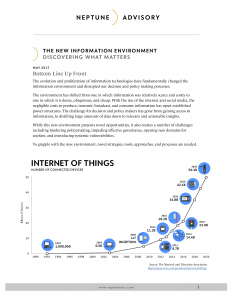
The evolution and proliferation of information technologies has fundamentally changed the information environment and disrupted our decision and policy making processes. The environment has shifted from one in which information was relatively scarce and costly to one in which it is dense, ubiquitous, and cheap. With the rise of the internet and social media, the negligible costs to produce, transmit, broadcast, and consume information has upset established power structures. The challenge for decision and policy makers has gone from gaining access to information, to distilling large amounts of data down to relevant and actionable insights. While this new environment presents novel opportunities, it also creates a number of challenges including hindering policymaking, impeding effective governance, opening new domains for warfare, and introducing systemic vulnerabilities.
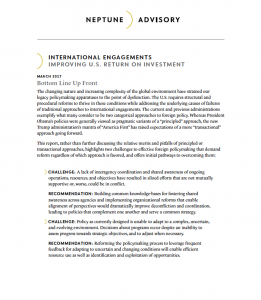
The changing nature and increasing complexity of the global environment have strained our legacy policymaking apparatuses to the point of dysfunction. The U.S. is in need of structural and procedural reforms to thrive in the current global environment. This report highlights two challenges to effective foreign policymaking that demand reform and offers initial pathways to overcoming them.
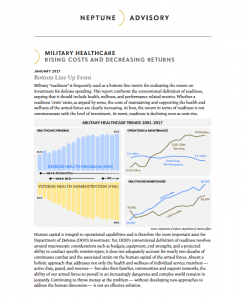
Military “readiness” is frequently used as a bottom line metric for evaluating the return on investment for defense spending. This report explores the relationship between the state of military healthcare and readiness. The report found that the conventional definition of readiness has been limited to budgets, equipment, and end strengths, and ignores the essential human component. Increasing healthcare costs and a prevalence of mental illness significantly strain the force. An alternative approach to military healthcare and wellness is necessary, one that can be personalized and scaled to meet the full complexity of the issues facing our military community.
Approach
We apply a proprietary analytical process that leverages a programmatic rating system, library of research products, and a broad community of stakeholders to put the most relevant data sets and issues into context.
Neptune’s collaborative approach relies on the team’s diverse backgrounds in industry, financial services, and government, allowing us to provide a truly unique perspective – one based on publicly available information and a depth and breadth of knowledge.
Our blended thesis provides the starting point for our analysis, but the foundation is our Program Rating System (PRS), which identifies key variables and decision points that impact the revenues of a company. An index of small to mid-sized companies is the main source of key programs for rating. Regularly published programmatic & policy research refreshes and expands our view of the marketplace, while unique events provide insight into a broad community of stakeholders. Together, these analytical processes allow for quick iteration on any given issue, and a comprehensive understanding of relevant data.
We view our clients as teammates in our analysis and seek the give-and-take required to gain true intellectual asymmetries needed to be successful in today’s investing environment. As a result, our clients gain indispensable insight, refine their market perspectives, and become better positioned to act quickly and confidently.